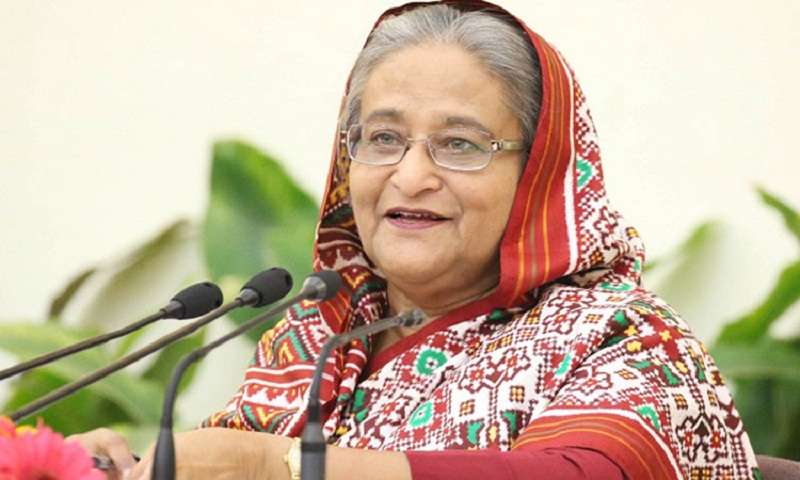

Bangladesh Prime Minister Sheikh Hasina
Sultana’s dream, a story first published in 1905, in an English language publication called The Indian Ladies’ Magazine was a story of a utopian world. It depicted a world called Ladyland, where women ran everything and men remained in seclusion – spinning the traditional gender roles and the public/private divide on its head. It was a somewhat revolutionary text, just as its writer, Rokeya Shakhawat Hossain was. Begum Rokeya has now been recognised as one of the earliest feminist writers in colonial Bengal. While she’s not the only woman to have written about issues pertaining to women and their lives in a largely patriarchal society, she is recognised as a pioneer of sorts, due to the radical nature of her texts. She dreamt up a fantastical world, that safe to say, even today, remains quite revolutionary. Yet Bangladesh today seems set on its way to prove that Begum Rokeya’s dream might not be so far-fetched after all.
Bangladesh, led by its women premiers is a beacon of light in the subcontinent, where a right as basic as education for women is in jeopardy today (the recent Taliban crackdown on the education of girls in Afghanistan). It is true that the subcontinent’s political history has been rather unique in comparison to the rest of the world, in the sense that women have always occupied important political offices. Yet, the Bangladeshi parliament with women occupying the key positions of the speaker, the leader of the house, the leader of the opposition and most likely a new woman president of the country, is still an exceptional sight.
After being liberated from West Pakistan, after a decade long struggle led by Bangabandhu Sheikh Mujibur Rahman in 1971, the newly minted nation state of Bangladesh was founded on the principles of secular nationalism with an emphasis on the Bengali language. The Bangladeshi national identity has always united its population on the basis of, not religion, but the Bengali language and culture. The documented history of the Bangladesh struggle for independence tells us that Bangladeshi women have always been an integral part of defining and asserting this secular, language-based cultural nationalism, through their attire and their actions.
Even after independence, every year, on the 21st of February, commemorated as Shaheed Dibash, colloquially knowns as Ekushey, Bangladeshi women celebrate the liberation struggle in a typically ritualistic fashion. Adorned in sarees and bindis, they gather to make alpanas or drawings made of rice flour paste as a means of upholding with pride, their secular national identity as well as the syncretic and inclusive nature of their Islam. This ritual is especially powerful when one considers that their Bengaliness and similarity to the culture of West Bengal in India had been instrumentalised by the West Pakistani government to treat the erstwhile East Pakistanis as lesser Muslims and ultimately, second class citizens.
The Bangladeshi political landscape has changed considerably since 1971. Especially after the death of Bangabandhu religious fundamentalist groups have permeated into mainstream politics. These extremist, anti-social elements have sought to restrict and control Bangladeshi women’s behaviour and attire through threatening speeches and violence, as a way to reinstate a patriarchal Islamic state. In this context, the continued involvement of women in public life and their steady rise in Bangladeshi politics is of crucial importance.
The uproar amongst many sections of Bangladeshi society over the assault of a female college teacher by a constable for wearing a bindi or teep, last year, is reflective of a mature political culture whose bedrock remains secular and progressive values. The Sheikh Hasina-led cabinet of women in high political positions and her commitment to continuing inclusion of women in politics, is central to keeping this foundation strong and unbreachable. The current education minister, Dr Dipu Moni has been a fixture in the Prime Minister’s cabinet since 2009, when she was appointed the first woman foreign minister. She has been especially outspoken in her resistance to Islamic radicals’ attempt to regulate women’s lives in the name of religion. In the aftermath of the teep issue, she uploaded pictures of herself sporting a teep on her social media, with the caption “I am a human, a Muslim, a Bengali, a Woman”, asserting her right to wear a teep as a Bengali Muslim woman.
Women ministers aside, the true realisation of Begum Rokeya’s dream of Ladyland is taking place at the grassroots level. Bangladesh had attained gender parity in primary and secondary education by 2014, mainly because of initiatives like providing tuition for girls in rural areas. This, combined with effective maternal care, has empowered rural Bangladeshi women to take up the reins of running their households. The impressive presence of women at the highest political echelons is mirrored at the local level, where committees of women have formed to monitor and implement government provisions for better sanitation, healthcare and water management in villages as well as slums. Women of rural Bangladesh have become mediators between the people of their areas and the government, keeping the cycle of self-empowerment going strong. Education and economic independence therefore, have become the foundation on which Begum Rokeya’s feminist daughters continue to build the nation of Bangladesh.
Current bullion market is focusing on a combination of factors which includes direction of US…
National Security Advisor Ajit Doval on Friday slammed foreign media for their reportage of Operation…
The Bharat Utsav, a festival celebrating India's rich culture, heritage, and tradition, has begun in…
Minister of State for External Affairs, MoS Pabitra Margherita, co-chaired the ASEAN-India Foreign Ministers' Meeting…
Wholesale inflation in India likely surged to 0.80 per cent year-on-year in June 2025 from…
The Indian Coast Guard rescued two United States nationals stranded about 53 miles south of…